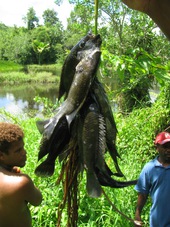Highlight
Risk assessment of the introduction of Nile tilapia to the Solomon Islands
Achievement/Results
As part of the University of Minnesota’s NSF-funded Introduced Species and Genotypes Integrative Graduate Education and Research Traineeship (IGERT), a team of six trainees developed a conceptual model of the risks and benefits of the potential introduction of Genetically Improved Farmed Tilapia (GIFT) to Solomon Islands. The conceptual model attempts to illustrate both the benefits of introducing a non-native, fast-growing fish to develop an aquaculture industry and improve access to protein for a growing human population as well as the potential for ecological harm in the event that the fish or fish byproducts would escape into natural waterways. Conceptual models are useful in the risk assessment process as tools for systematically and transparently evaluating risks, communicating risks to stakeholders, and assessing management options.
The interdisciplinary nature of the IGERT and the diverse skill-set within the trainee cohort facilitated the development of a model that includes both economic and ecological elements relevant to the introduction. Although they drew inspiration and methodology from many published conceptual models, they found no published examples that included both economic and ecological elements in conceptual models of the impacts of species introductions. They contend that conceptual models addressing both economic and ecological factors, and particularly the interactions between them, can be useful tools for decision makers. Under the mentorship of practicum leader Dr. Frances Homans, trainees worked with The WorldFish Center, developers of the GIFT variety of tilapia and our IGERT partner, on this project. To facilitate informed development of the conceptual model, two trainees traveled to Solomon Islands to meet with government officials, local farmers, and other stakeholders.
Nearing the end of the conceptual model development phase of the project, two trainees traveled to WorldFish Headquarters in Malaysia to collaboratively revise the model. Additionally, two trainees presented a simplified model to representatives from fisheries departments from multiple Pacific Island nations at a Secretariat of the Pacific Community conference in New Caledonia. The final document produced by the cohort will be used to inform the official tilapia import risk assessment contracted by the Solomon Islands government and further distributed by WorldFish to other countries considering similar introductions. This is a significant contribution to Solomon Islands, and potentially other countries in the region, where conducting ecological risk assessments for introduced species is a relatively new practice.
Address Goals
The teamwork and collaborative research skills developed during the practicum and this project will enable our trainees to become leaders in collaborative environmental research and risk analysis. The group has developed an impressive array of skills and the ability to collaborate both in person and electronically, near and far. They also gained a much greater appreciate for limiting issues in developing island nations were nutrition needs are severe and might obviate a complete rejection of introduction. They thus learned the need to identify possible mitigation strategies as well as identifying risk.
The analyses and final report advances our ability to identify and assess risks of aquacultural introductions and improve the overall ecological risk assessment approach. The results will be very useful to the Solomons Island Government as it determines if it should approve the introduction of GIFT tilapia and what conditions it should place on any introduction. The information and the process developed is also of interest to the fisheries mangers in the Secretariat of the Pacific Community as other island nations also assess the suitability of GIFT for their countries. Finally, The WorldFish Center is particularly interested in the approach used and the issues identified. They developed the GIFT tilapia to address food needs of developing countries but have never before conducted a complete risk assessment. As more countries consider introductions there is increasing need for a good risk assessment approach and WorldFish particularly sought our expertise. The Secretariat of the Pacific Community has now contracted a risk assessment that will be informed by our analyses.









